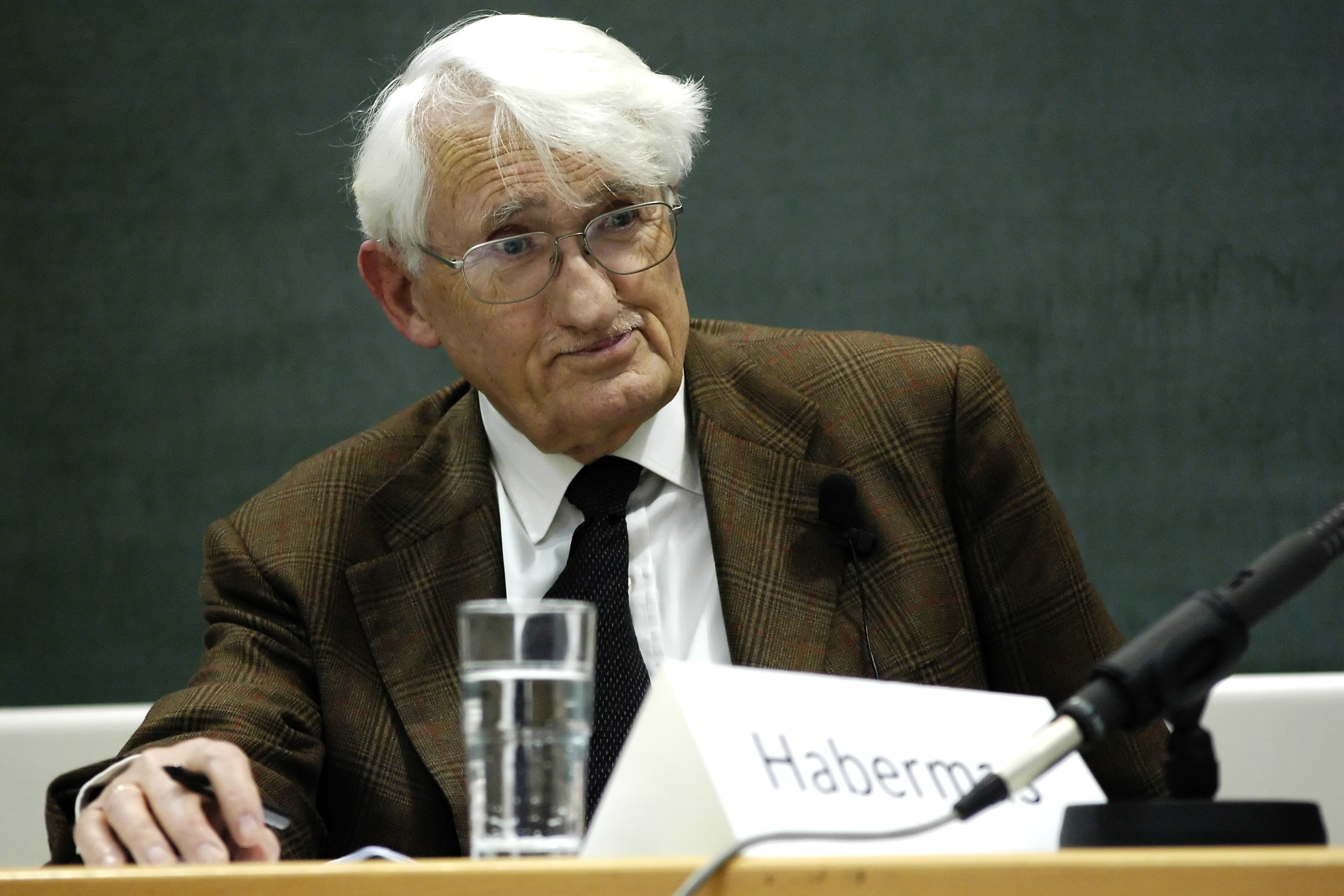Fonte - Livro: HABERMAS, Jürgen. Sobre o poder das teorias: e sobre a sua impotência. IN: HABERMAS, Jürgen. Diagnósticos do tempo: seis ensaios. Rio de Janeiro: Tempo Brasileiro, 2005."
Jürgen Habermas Frases famosas
Fonte - Livro: HABERMAS, Jürgen. Verdade e justificação: ensaios filosóficos. São Paulo, Edições Loyola, 2004.
Fonte - Livro: HABERMAS, Jürgen. Mudança estrutural da esfera pública: investigações quanto a categoria da sociedade burguesa. Rio de Janeiro: Tempo Brasileiro, 2003. p. 16"
Jürgen Habermas frases e citações
Fonte - Livro: HABERMAS, Jürgen. Teoria do agir comunicativo: racionalidade da ação e racionalização social. São Paulo: Editora WMF Martins Fontes, 2012. V.1, p. 191"
“Uma pretensão de validade pode ser manifestada por um falante diante de (no mínimo) um ouvinte.”
Fonte - Livro: HABERMAS, Jürgen. Teoria do agir comunicativo: racionalidade da ação e racionalização social. São Paulo: Editora WMF Martins Fontes, 2012. V.1, p. 82"
Fonte - Livro: HABERMAS, Jürgen. Teoria do agir comunicativo: racionalidade da ação e racionalização social. São Paulo: Editora WMF Martins Fontes, 2012. V.1, p.48"
Jürgen Habermas: Frases em inglês
Habermas (1979) cited in: Werner Ulrich (1983) Critical heuristics of social planning. p. 123
Fonte: Knowledge and Human Interests, 1971, p. 310 as cited in: Dominick LaCapra (1983) Rethinking Intellectual History: Texts, Contexts, Language. p. 170
Habermas (2004) in: Giovanna Borradori (2004) Philosophy in a Time of Terror: : Dialogues with Jurgen Habermas and Jacques Derrida. p. 34
Habermas (2006) "Conversation about God and the World." Time of transitions. Cambridge: Polity Press, p. 150-151.
Fonte: The Structural Transformation of the Public Sphere, 1963/1991, p. 222
Fonte: The Structural Transformation of the Public Sphere, 1963/1991, p. 27
Habermas (2003) The Future of Human Nature. p. 10
Fonte: Knowledge and Human Interests, 1971, p. 301
Fonte: Knowledge and Human Interests, 1971, p. 266
Fonte: The Structural Transformation of the Public Sphere, 1963/1991, p. 7 as cited in: Benedetto Fontana, Cary J. Nederman, Gary Remer (2004) Talking Democracy: Historical Perspectives on Rhetoric and Democracy. p. 222
Fonte: On the Pragmatics of Communication, 1998, p. 23
Fonte: The Structural Transformation of the Public Sphere, 1963/1991, p. 1 as cited in: Gandy, M (1997) "Ecology, modernity and the intellectual legacy of the Frankfurt School". In: Light, A and Smith, JM, (eds.) Space, Place and Environmental Ethics. p. 240
Habermas (1998) The Inclusion of the Other: Studies in Political Theory. Ciaran Cronin and Pablo De Greiff, eds. Cambridge, MA: The MIT Press.
Fonte: The Structural Transformation of the Public Sphere, 1963/1991, p. 65
Fonte: Moral Consciousness and Communicative Action (1983), p. 5
Fonte: On the Pragmatics of Communication, 1998, p. 21
Habermas (1993) "Further reflections on the public sphere", in: Craig Calhoun Eds. Habermas and the Public Sphere. MIT Press. p. 441
Fonte: Knowledge and Human Interests, 1971, p. 4
Fonte: The Theory of Communicative Action, 1987, p. 308
Fonte: Moral Consciousness and Communicative Action (1983), p. 26
Habermas (1972) "Sprachspiel, intention und Bedeutung. Zu Motiven bei Sellars und Wittgenstein". In R.W. Wiggerhaus (Ed.) Sprachanalyse and Soziologie. Frankfurt: Suhrkamp). p. 334
This is called the paradoxical achievement of intersubjectivity
Fonte: The Structural Transformation of the Public Sphere, 1963/1991, p.xvii
Fonte: On the Pragmatics of Communication, 1998, p. 22
Fonte: Knowledge and Human Interests, 1971, p. 4
